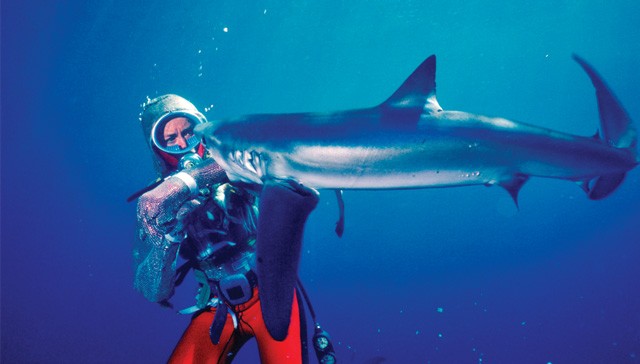by Steve Desroches
Valerie Taylor may well be the only person in the world who ever intentionally tried to get a shark to bite her. And succeeded. It took quite a long time actually to get a shark to take a hold of her arm, but ultimately one did and it changed the course of science and our understanding of these animals that have been on Earth for over 100 million years. Taylor and her husband Ron were already household names in Australia when they filmed the TV movie Operation Shark Bite in 1979 with Valerie donning a chain mail suit to test against the bite of a shark. The gloves worn by deboning butchers and medieval chain mail inspired the US$2000 prototype, but it turned out to be too big for Ron, so Valerie gave it a go. When the shark bit, it moved its head back and forth in a sawing motion. The Taylors had observed this hundreds of times before. Conventional wisdom and the belief of shark experts at the time were that the jaws of the fish produced so much pressure that they crushed as well as they cut. Not so, said the Taylors, and they had proof as the suit worked and Valerie’s arm was not only fully intact, she felt little pressure at all. The experiment landed her on the cover of National Geographic and the suit a place in the collection of the Australian National Maritime Museum in Sydney, the Taylors’ hometown.
That encounter with a real shark would seem to be enough to make Valerie famous worldwide, but it was the Taylors’ relationship with a fake shark, that often didn’t work, that propelled them both to celebrity outside of Australia as the diving couple shot memorable footage for the first Hollywood blockbuster, Jaws. Their life’s work as divers, filmmakers, and shark experts is a riveting tale chronicled in the new Australian documentary Playing with Sharks, which will screen this week at the Provincetown International Film Festival. Their journey from being champion spearfishers to ocean conservationists to being the most well-known advocates for sharks and changing their troubled image, in part because of the novel and film Jaws, is packaged in a life of adventure.
“I was very attracted to trying to tell a story about people trying to live life on their own terms,” says director Sally Aitken via a Zoom call from Sydney with producer Bettina Dalton and Taylor herself. “So I was a bit allergic, if you will, to do a natural history film, but rather do a film about someone we could learn from about a life well-lived.”
Playing with Sharks is not just a wildlife documentary, but also the story of a fantastic love affair of the Taylors’ 50-year marriage and their commitment to recording sharks, and other magnificent creatures of the world’s oceans. It’s the story of an equal partnership though Valerie did become largely the face of their work that at the age of 86 she continues alone after the 2012 death of Ron from acute myeloid leukemia. Their pioneering energy and the embodiment of the Australian spirit of going into the wild with gusto put them on par with great conservationists like Dian Fossey, Jacques Cousteau, and Jane Goodall. The big difference though is that the Taylor’s didn’t have nearly the funding of their contemporaries forging out to sea in a small tin boat diving first in cages and then free diving surrounded by sharks. And much like in the Academy Award-winning documentary My Octopus Teacher, the sharks of the world taught the Taylor’s so much, including that each shark has a personality.
“Pretty much the same as a wild dog,” says Taylor. “Like most wild animals they’re attracted to food. Some are shy, some are the leader. They’re trying to figure me out and most will take the food out of my hand. They can learn, too, very quickly. The trick to getting a shark to learn something is to pick the friendly guy.”
There are over 400 species of sharks currently in the world, hanging on despite enormous pressure from pollution, exploitation of marine habitats, and in particular the demand for shark fin soup, a delicacy in much of East Asia, especially China where a growing middle class is increasing demand for this unsustainable dish. The Animal Welfare Institute estimates each year over 70 million sharks are killed, largely to meet the demand for shark fin soup, putting 70 species at risk for extinction. All this just for soup. It has Taylor feeling hopeless for the future. But just this week the United States Senate passed legislation to strengthen existing anti-finning laws. And the European Union and over 30 other nations have also passed bans, but until China, Japan, Russia, Malaysia, and North and South Korea act, it may not be enough to save sharks.

One aspect that is on the decline as to the desperate state of the shark is hunting them out of fear. Even before Jaws, the prevalent attitude was that the only good shark is a dead shark. Much of what was thought to be known about sharks was based on old sailor’s myths and just plain old ignorance. But the Taylor’s changed much of that, but faced a setback with the film Jaws. It surprised all involved that a fictional movie motivated people to kill sharks out of the fear it induced. The Taylor’s began a global media campaign trying to calm the public and their irrational fears. It at times felt futile, especially when it came to the Great White shark, which took on a monstrous persona. But that’s changing. Increasingly around the world support for shark conservation is growing, for the Great White, too, and shark diving tours and the like are becoming a large part of many tourist economies. That’s a phenomenon happening here on the Cape tip as the Great White sharks continue to cruise our coastline in large numbers, leading to a new shark museum set to open on the end of MacMillan Pier in 2022 with shark watching tours, too. For those afraid of these magnificent animals, Taylor has sage advice.
“Well, I say if you’re afraid of sharks, swim where there aren’t any sharks,” says Taylor. “We don’t belong in the water. It’s an alien environment to humans. It’s a choice we make when deciding to go in the water. So we owe it to sharks to protect them. The responsibility is on us when we enter the water. You have a decision when you’re going into the water, a wilderness. There’s a risk in everything, but you’re more likely to drown or get hurt on the way to the beach than ever even encounter a shark.”
Playing with Sharks screens at the Provincetown International Film Festival Sunday, June 20 at 11:30 a.m. at the Waters Edge Cinema, Whaler’s Wharf, 237 Commercial St. (as well as streaming online starting June 16). Tickets are $20 (virtual $12). Tickets must be purchased in advance at provincetownfilm.org. For more information call 508.487.3456.











